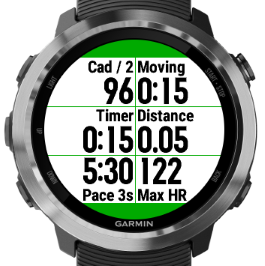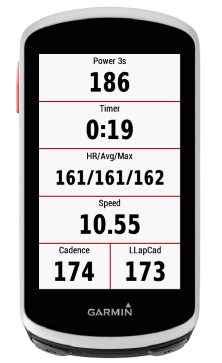If you want to get fancy, there's conditional expressions (like IF in Excel), functions for data analysis (like MIN and AVG), and the data field can also display the text of your choice. The resulting data can be (optionally) written to the activity FIT file.
With AppBuilder, you can implement almost any field that involves math, such as: calculating normalized power and saving the data to the FIT activity file, showing the average pace for even-numbered laps, or recording the amount of time you sprinted.
Full documentation and examples here:
http://ciq-appbuilder.blogspot.com/
AppBuilder 5:
Now with new features! AppBuilder 5 is a completely new app, so please check it out in the store if you are interested in any of the new features.
https://apps.garmin.com/en-US/apps/fd690281-9c22-4fee-a81e-3b7f39aa67c5
- Store up to four formulas per app. Switch between formulas directly on the watch, without using a phone or PC. With four clone apps, you can store up to 16 formulas total
- User variables. Allows for powerful formulas where information can be stored at one point, like the start of a lap, and used later. e.g. Lap elevation change
- Improved timeavg() options. Allows for simpler, more flexible normalized power function
- More functions and variables
4 clones of AppBuilder are available in the store, so you can have 2 formulas in the same activity
- and store up to 16 different formulas in all.
- 3 for 735XT, 4 for Edge devices
AppBuilder 5+:
All the power of AppBuilder 5 in a full-screen datafield with four or six fields, for cutting-edge watches and Edge cycling computers:
https://apps.garmin.com/en-US/apps/394941a6-4e73-4843-820b-fdcfbc877f3a
AppBuilder Classic:
Supports all your existing formulas forever, no matter how complex. 4 clones are available in the store, so you can store up to 4 different formulas.
https://apps.garmin.com/en-US/apps/deb4b872-48be-409c-b91a-9b8485d2fc80
See all my apps here, including all AppBuilder clones, and Distance to Start, Time to Start and Elevation Change as standalone apps:
https://apps.garmin.com/en-US/developer/8545c609-c030-4c0c-b3d8-4bc63ebdc901/apps
I created this app as a fun project in response to an interesting user suggestion. So I'd love to hear if anyone thinks this is practical or useful, and what kinds of extra features you would like to see, if any.
Feel free to share any useful formulas of your own in the thread!




